On Saturday 21 November, 140 residents of camp Katsikas were tested for COVID-19 in an orchestrated procedure. According to several camp residents we spoke with, the explanation provided by authorities was the detection of a positive COVID-19 case inside the camp. A local news source reported later that a total of 10 people were tested positive for the virus.
The communication around the testing and quarantining procedures from the side of the responsible authorities has been extremely unclear, both towards the residents of the camp and towards the public. Several people who tested positive in the camp were asked to quarantine inside their containers – together with other, healthy individuals. The containers measure approximately 50 square metres – a space shared by up to 8 individuals which are sometimes two different families. All people within one container share a kitchen space and one bathroom. By forcing healthy and contagious people to remain in the same space instead of providing isolated spaces for quarantine, healthy people are being put at risk of getting infected.
We spoke with a resident of camp Katsikas who tested negative but now finds himself confined in a container with others who tested positive. He stated: “After the authorities told us that our roommate had been tested positive for corona, they went on to test the other two of us who share the container as well. My other roommate and I tested negative. On the next day, a larger number of people in the camp got tested, including – again – my roommate and I. As on the previous day, the results for a COVID-19 infection were negative for both of us. We were told to quarantine in the container for two weeks. I strongly believe that a person who tested positive for COVID-19 should not be quarantined with healthy people who have negative test results. It’s important to separate them, to make sure that the virus does not spread to the healthy people. Other people in other caravans are being treated the same way. Also in their cases, people who tested negative are still being quarantined with a sick person, even after testing negative several times. With only one bathroom and one kitchen and very little space, it’s impossible for us to keep our distance. Moreover, personal hygiene products were only provided after three days – and disinfectants have not been provided at all. A healthy diet would be another very important thing in order to not get sick but the food supplies that were provided are not nutritious.”
“It’s important to separate people who tested positive from healthy people, to make sure that the virus does not spread.”
No official statement regarding testing and quarantining procedures in Camp Katsikas were released. Different camp residents report contradicting pieces of information regarding rules and restrictions. People seem to be aware of the fact that there are positive cases among the camp residents and that nobody should visit friends or neighbours in their containers. But there seems to be a lack of information around the question of whether people are allowed to leave the camp and whether different restrictions apply to individuals that can show a negative test result or have special permission from the camp management. The contradicting statements we hear make clear that the communication and information provided by authorities is insufficient. This is absolutely unacceptable in a context in which people’s basic individual freedoms are being limited.
Greece has been under a nation-wide lockdown since 7 November. While the lockdown was initially due to end on Saturday 28 November, it has now been extended until 7 December. Under the current restrictions, all non-essential retail businesses are closed and all people residing in Greece must fill in a form stating their reason – selected from a list of six essential reasons – for leaving the house. Police checkpoints have been put in place to monitor the implementation of these restrictions.

